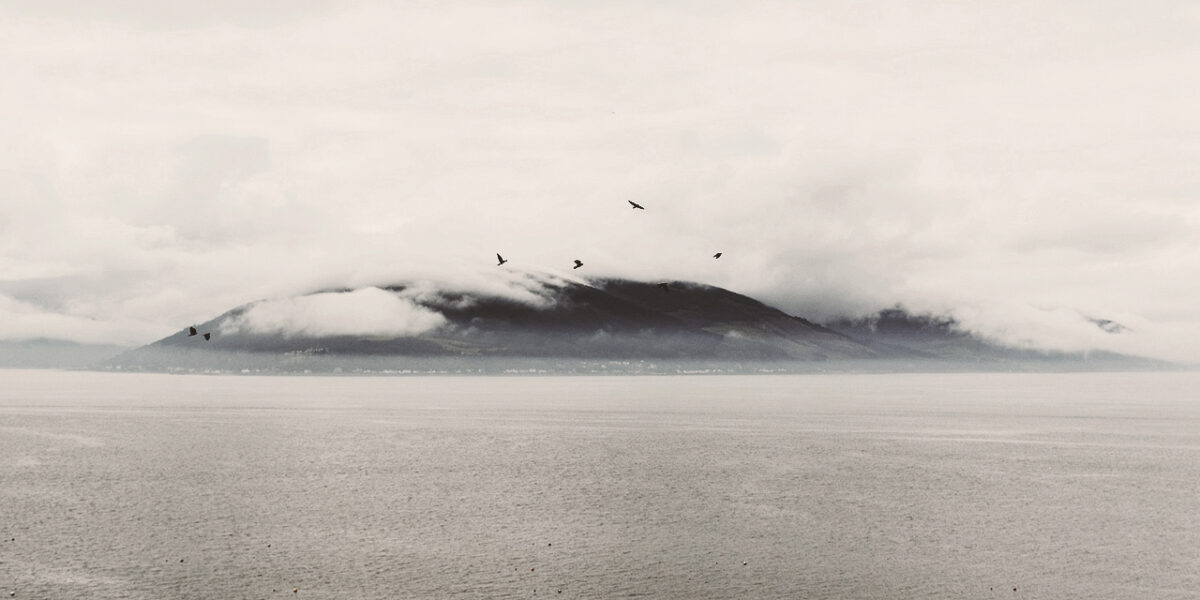I first discovered Clota many moons ago when I began researching the existence of Scottish goddesses (like Dia Greine and the Cailleach) but there was so little known about her that I didn’t spend much time digging any deeper. After a recent conversation with a friend put her back on my radar, I decided to have another go at it and see if I could find out enough about Clota to make her worth writing about.
I grew up with the Clyde. I spent my childhood and early adulthood on its banks, and I can just make out its slate surface in the distance now, across the farms and fields that surround my current home. The river’s always held a fascination for me, and the thought that it might take its name from a female Celtic deity, connecting it to my love of folklore and mythology, was incredibly exciting. But nothing’s ever easy, and, because of her great age, Clota is a particularly elusive figure.
The river Clyde is ancient. Prehistoric. Its waters flow for one hundred and ten miles from the Lowther Hills to the Firth of Clyde, and the lengths of its banks have been settled on for fourteen thousand years. Water worship was widespread in the Celtic countries, particularly at wells and springs, but also extending to larger bodies of water. The Celts regarded rivers as sources of fertility, givers of life, and it would definitely have been unusual for there not to have been a Goddess associated with the Clyde.
In Wonder Tales from Scottish Myth and Legend (1917), Donald MacKenzie says:
Almost all the rivers of Scotland were abodes of goddesses, but about many of them there are no surviving stories. The character of a goddess was suggested by that of a river. The goddess of the river Forth, for instance, was ‘the deaf or soundless one’, because the Forth is a comparatively silent river; the goddess of the Clyde, on the other hand, was ‘the purifying one’, because the old people knew it as a river which scoured the country it passed through, and carried much mud and clay seaward when in flood.
Until the arrival of the Romans in the 1st century AD, the Clyde was known to the Brythonic Celts of the Iron Age as Clut, meaning clean, or Clywwd, meaning loud, or heard from a distance.
In 77 AD, the Gaulish Roman General Gnaeus Julius Agricola journeyed to Britain to take up his position of Governor of Brittania, and to complete the conquest of its lands. Agricola travelled up the country through Wales and northern England before pushing further north to the Highlands of Scotland. It’s in the Roman historian Tacitus’s account of this journey, written twenty-two years later, that we first learn the Latinised name of the river we now know as the Clyde: Clota.
There are no records of any battles around the river in this time, suggesting that the Roman Empire integrated with the local peoples without meeting much resistance, no doubt due at least in part to the similarities in the belief systems of the Romans and the Celtic Britons. Both cultures were polytheistic and animistic, believing that gods or spirits were present in all parts of the natural environment, particularly in water. Local deities would continue to be honoured while gradually being merged with their Roman equivalents, to the extent that it’s now often very difficult to distinguish between Celtic deities that existed in pre-Roman Britain and those that were imported with the Romans.
This blending process, known as syncretism, was a common one in the course of the Roman conquest, and in looking for a counterpart for Clota, we find her closely associated with the Gaulish water nymph, Clutoida.
Very few sources referencing Clota as a goddess exist, and none give us any more information than her name, but thanks to inscriptions discovered at archaeological digs at two separate sites near the ancient Gaulish town of Bibracte, we have a little more information on Clutoida.
Clutoida’s name is found in two engravings, both addressing her using the prefix dea: goddess. The first is inscribed on a wall, and reads:
Augusto sacrum deae Clutoidae et vicanis Masavensibus Medius Acer Medianni filius murum inter acrus duos cum suis ornamentis de suo dedit
Sacred to Augustus, to the goddess Clutoida and to the deities of the inhabitants of the vicus of Masava. Medius Acer, son of Mediannus, had this wall erected between two archways with its ornaments.
The second is a dedication engraved on a crotalum, a type of musical instrument similar to castanets, made from brass, shell, or wood. The inscription reads:
Dea Clutoidae Elatussio
To the goddess Clutoida, Elatussio offered this.
Instruments like the crotalum were used ritually to attract the attention of the gods, and the word crotalum itself is also used to refer to a noisy or talkative person. The archaeologist and historian Jean-Jacques Hatt states that the appearance of Clutoida’s name on such an instrument suggests that she may have been associated with the gift of listening, a divine ear, a particularly interesting suggestion when you consider the meanings of one of the early names of the Clyde: Clywwd, meaning loud, or heard from a distance.
The worship of Clota would presumably have continued in the Clyde basin until the advent of Christianity in Scotland. The Damnonii, who inhabited Alt Clut, or Strath-Clota, the area around the river that would eventually become the Kingdom of Strathclyde, until around 8AD were probably the last people to venerate her.
In 1967, a 2000-year-old carved tricephalos was unearthed in Wishaw, close to the River Clyde, and was determined to originate with the Damnonii. Whilst the eminent Celtic scholar Anne Ross discerned its three faces as male, she also believed that such an object could not have come to exist without a connection to the patron deity of the river. In the Glasgow Archaeological Journal she states:
It may be suggested that Heads 1 and 2 gaze out fiercely towards the sacred waters while the Face peers upwards towards the sun, from which the powers of healing were believed to emanate in conjunction with the waters.
The river Clyde was clearly venerated in pagan Celtic times as, or in connection with, a goddess. Whether this tricephalos stands for three individual deities or for a single deity in its threefold capacity, or merely for the concept of divinity in general, we cannot say, but we may hazard a guess that here we have a portrayal in various guises of a powerful god…connected with the cult of springs, or of the river itself, and perhaps even the mate of the mighty goddess of the Clyde – Clota.
So, it seems indisputable that there would have been a goddess associated with the river, as with all rivers, and the likelihood is that she was a pre-Celtic goddess whose original name has been lost to time, but who nonetheless gave her name to the Clyde. She was known to the Brythonic Celtic and Cumbric peoples of her banks as Clut, or Clywwd, though her first recorded name was Clota.
From the practical benefits of transportation, commerce, and the provision of food, to its less tangible qualities of regeneration, fertility, and healing, the Clyde was central to the lives of its settlers and it’s easy to understand why it was deified. As time marched on the river became a platform for industry, and was a vital conduit in establishing Glasgow as a hub of international trade.
Although Clota has been forgotten, the river Clyde remains an important and iconic part of Scotland’s geography, and is still much beloved by her people.






Diane Stevenson says:
I really enjoyed reading your findings. Thank you so much for making this accessable
February 23, 2021 — 9:31 am
Fee says:
Thanks so much for your comment, Diane! I’m really glad you enjoyed it.
February 24, 2021 — 1:51 pm
Zac says:
Really enjoyed this. Making my sons middle name Clyde, I really wanted to know the root meaning and Origin of it. So I will go with “Purifying River” & “Heard from a distance”. As his first name is Zekiel Meaning “ Gods Strength”
His name will be, “Gods Strength is heard from a Distance” Or “Gods Strength is a Cleansing River”
November 3, 2021 — 1:06 am
Michelle Tracey says:
Stunning.
What a significant name to carry.
October 12, 2023 — 2:05 am
Paul Woods says:
Thank you for writing this, I have found myself fascinated by the early history of the Clyde. I grew up in Greenock and Sandbank until I was 12 and emigrated to the US. But I find myself thinking back to trips across the. Clyde on CalMac ferries and just loved looking out at the river and it’s greenish blackness, especially in rough waters.
March 2, 2021 — 9:01 pm
Fee says:
Thanks so much for your comment, Paul! The Clyde is such an interesting river. I’ve been reading a lot about the archaeological finds along its banks and it is endlessly fascinating.
March 3, 2021 — 3:06 pm
Priscilla Poupore says:
Wow! Magic! Meditating with Brown Jasper and this great article and Goddess appeared! My farm’s address is Clyde, Texas. I am of Gaulish ancestry and mesmerized by archeology!! A million thanks ! I hope to hear from you some more
August 28, 2022 — 3:09 pm
Pauline says:
Not completely forgotten as I know she is honoured by quite a few of Glasgow’s pagans but it is a case of reconnecting with her through personal experience as so little is known.
May 10, 2021 — 8:33 am
Fee says:
Thanks for your comment, Pauline. Hopefully between us all we can keep her memory alive.
May 11, 2021 — 8:03 am
Ness Bosch says:
Really good reading. Thank you for sharing.
Luckily we can still approach her in the spirit realm and learn from her.
May 10, 2021 — 10:21 am
Fee says:
Thank you, Ness ♥
May 11, 2021 — 8:04 am
Christine says:
Thank you for this. I grew up in Glasgow and now live in the Clyde valley and the Clyde has always been fascinating for me So interesting to think of the Romans being there and the merging of their religions
May 11, 2021 — 7:30 am
Fee says:
Thanks Christine. It’s such an engrossing topic, I really fell down the rabbit hole with this one! 🙂
May 11, 2021 — 8:08 am
Adam Robert Martin says:
This was a great resource for me as I was recently asked to create an illustration depicting Clota and it was really hard to research her! This was great inspiration, so thank you for this!
February 23, 2022 — 4:39 pm
Priscilla Poupore says:
I would love to see your creation
August 28, 2022 — 3:10 pm
Akhil Kumar Sahoo says:
Good reading. The geographical base of your looking at the river can be extended to include the Celtic migration to Europe. And how the Scottish idea of river worship owes its spiritual contents to our epic times can also be studied from your small but nice article. Thanks.
April 13, 2023 — 12:39 am
Fee says:
Thank you!
April 19, 2023 — 10:39 am
Kathryn Polley says:
A really informative article – thank you. I live in Helensburgh and my flat looks out onto the Clyde = it can be magical! I’ve been thinking about the river as material for a project (photography) and I’m just dipping my toe into stories about the river. Interestingly we have a representation of Clota on our new council buildings here, although there is some ambiguity because she is also said to represent Helen Colquhoun (Sutherland), wife of James who founded the town. If we can have such muddling of purpose in an artwork today it’s no wonder it’s so hard to find out about what people were thinking hundreds, thousands of years ago!
May 10, 2023 — 6:58 am
Paddy says:
It’s amazing to think of the fact for fourteen thousand years people inhabited the banks of this great and majestic river, living on the banks of the River Clyde myself I often sit and watch her flow by my window and wonder of the stories she could tell, as she has seen all that is, all that has ever been and highly likely that with the wisdom of the gods and all the knowledge and wisdom she has gained living amidst the generations of people over the years she would be able to accurately predict what is to come.
The Clyde is a very beautiful magical place with so many facets, and a bit of history like this offers the signposts to bring her deeper spiritual meaning alive and to be able to connect with her on a deeper level of understanding.
June 9, 2023 — 9:35 am
Michelle Tracey says:
Just found you and your writings….absolutely brilliant.
Definitely going to have a cuppa and a coorie while I read your treasures.
Thank you very much.
October 12, 2023 — 2:12 am